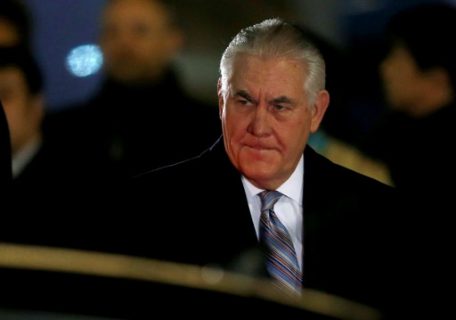
By Dave Clark
WASHINGTON, United States (AFP) — United States Secretary of State Rex Tillerson will meet with North Atlantic Treaty Organization members next week in Brussels, officials said Friday, as alliance diplomats worked to nail down the date.
“We are currently planning to hold the meeting of NATO foreign ministers on 31 March. Consultations on scheduling among Allies are ongoing,” a NATO official in Brussels said.
The NATO foreign ministers meeting had been planned for April 5, but that was thrown into chaos on Tuesday when Tillerson revealed he would not be attending.
US officials now say Tillerson will head to Brussels on Friday next week.
“The Secretary of State will visit NATO in Brussels, Belgium,” acting State Department spokesperson Mark Toner said, without revealing any details of planned meetings.
Long-planned talks
Officials suggested that a complicating factor might be the agenda of Britain’s Foreign Secretary Boris Johnson, who might not be able to make it to Brussels on March 31.
On Tuesday, the State Department confirmed that Tillerson would not be able to attend the long-planned April 5 and 6 meeting.
Chinese leader Xi Jinping is expected to visit President Donald Trump in the US in early April, and Tillerson would be expected to attend their meetings.
But his office has not confirmed that engagement, and word that Tillerson would stay away from the NATO talks stirred doubt about US commitment to its allies.
NATO member Turkey’s Foreign Minister Mevlut Cavusoglu has already announced that he expects to meet Tillerson in Ankara on Thursday, March 30.
Toner said Tillerson would also meet President Recep Tayyip Erdogan during the visit, and “discuss the way forward with our campaign to defeat ISIS in Syria and Iraq”.
After almost two months in the job, Tillerson has yet to appoint a deputy or any assistant secretaries, has largely avoided the media and works with a small inner circle of advisers.
The administration, meanwhile, has been scrambling to reaffirm its commitment to US military alliances after Trump called into question their usefulness during the presidential campaign.
Last week, after meeting Chancellor Angela Merkel, Trump claimed Germany owes “vast sums of money to NATO and the US,” reviving his charge that allies do not pay their way.
Obsolete alliance?
Defense Secretary Jim Mattis, a former Marine general, has declared US support for NATO, and last week Tillerson reaffirmed ties with Asian allies Japan and South Korea.
But Tillerson’s absence from the foreign ministers’ meeting would have been noted with concern, especially by newer East European members on its exposed east flank.
The US has worked with NATO to shore up support for the pro-western government in Kiev after Russia’s annexation of Crimea and its support for a bloody uprising in eastern Ukraine.
Combined with economic sanctions, the deployment of more NATO troops from Western members to frontline Eastern allies in the Baltics and Poland was intended to send a signal to Moscow.
But during his presidential campaign, Trump raised eyebrows by expressing admiration for Russian President Vladimir Putin and dismissing NATO as “obsolete.”






